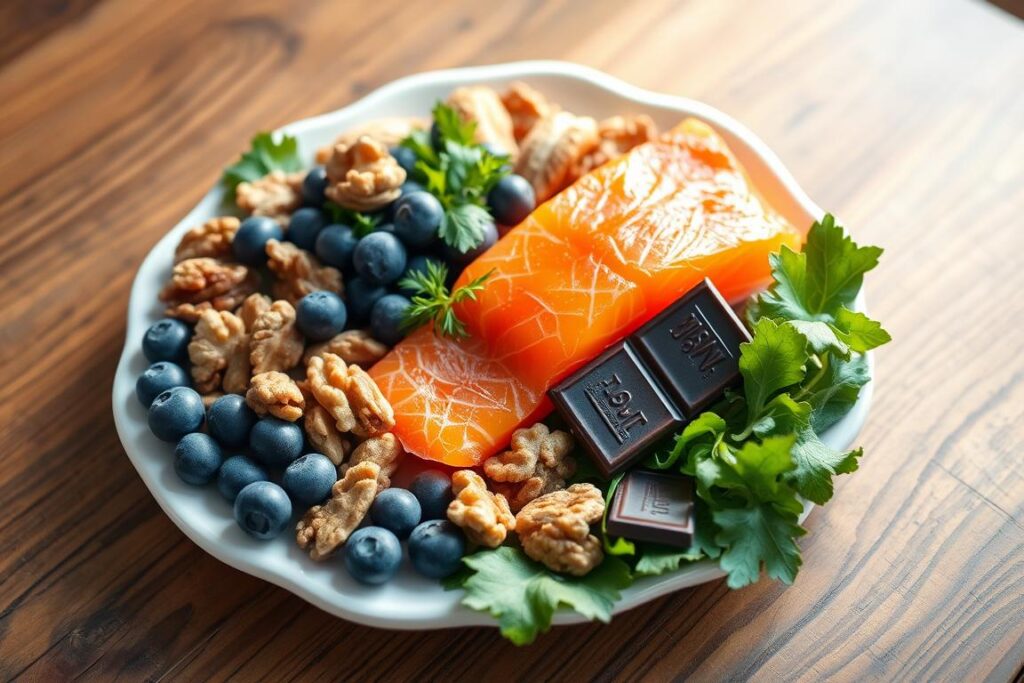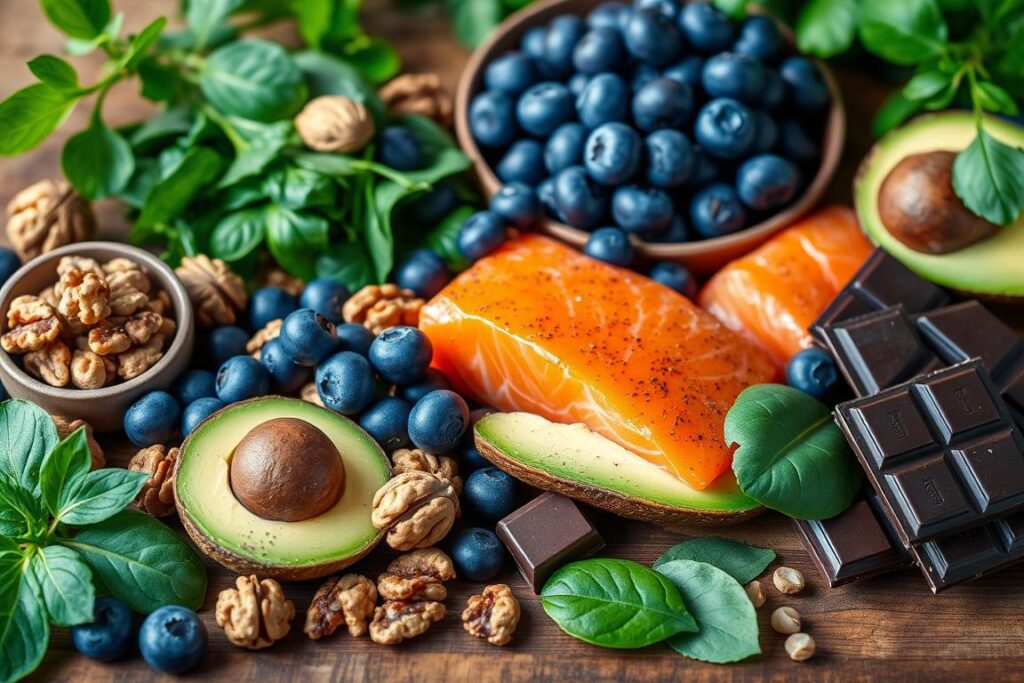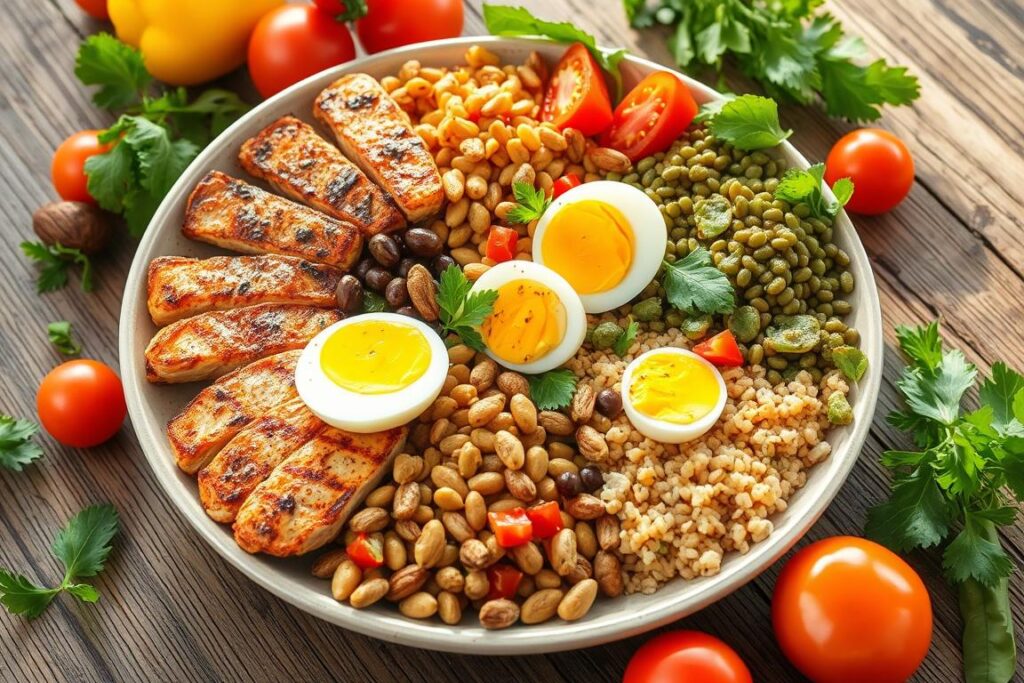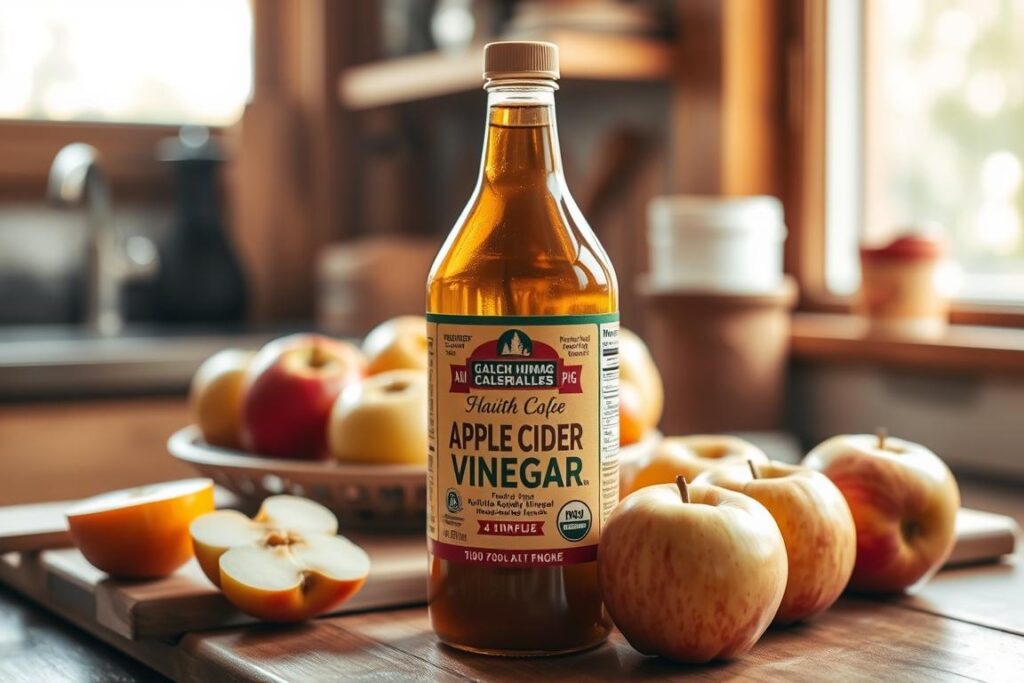According to the World Health Organization (WHO), dementia could affect 139 million people by 2050. This shows the importance of taking care of our brain healthBut what foods can we eat to improve our concentration and protect our brain?
Eating well is essential for the brain. Some studies show that nutrients such as vitamin B9 and lutein help maintain memory. Foods such as salmon, nuts, berries and green tea are rich in antioxidants and omega 3. They improve memory and cognitive function.
It is crucial to understand how food affects the brain. In this article, we will show you the best foods for memory. We will give you tips on how to include them in your diet and improve your memory.
The Relationship Between Diet and Brain Function
Nutrition is crucial for brain health. Nutrients are essential for brain cells to function properly. A nutrient-rich diet helps a lot in mental health.
Studies show that eating well from an early age is important. This helps keep your mind healthy until you’re 70. Eating too little variety can lead to a lack of vitamins and minerals, which can harm your brain.
How Nutrients Affect Our Brain
Fatty acids omega-3 are vital for the brain. They help keep brain cells healthy. Choline is also important for memory and muscle control.

The role of diet in cognitive health
Eating well is essential for the brain. Foods like avocado, nuts and salmon are great. The brain is made of 60% fat, so these foods are important. Antioxidants, such as vitamin E, protect brain cells.
Benefits of a proper diet for the brain
Eating well improves memory and concentration. It can also reduce the risk of diseases such as Alzheimer's and depression. Maintaining a balanced diet is essential for mental health throughout life.
Which Foods Improve Memory: Complete List
Have a healthy food list is crucial for memory. Fish like salmon, tuna and sardines are great. They have omega-3, essential for the brain.
Berries are also important. Strawberries, raspberries, blackberries and cherries should be eaten at least twice a week. Strawberries, for example, contain fisetin. It helps to store memories and strengthens neural connections.
| Food | Benefit |
|---|---|
| Fish (salmon, tuna, sardines) | Rich in omega-3, fundamental for the brain health |
| Red fruits (strawberries, raspberries, blackberries, cherries) | They help in the storage of memories and neural connections |
| Nuts and chestnuts | Rich in vitamin E and selenium, protect the brain during aging |
Extra virgin olive oil and dark chocolate also help your memory. They are rich in antioxidants. Including these foods in your diet is essential for brain health. They are perfect for improving memory.

Fish and Omega-3: The Champions of Memory
Fish are great for memory because of the omega-3. Salmon, for example, is very rich in this nutrient. It is one of the best fish for memory care.
Benefits of Salmon
Salmon has many benefits for the brain. It helps improve communication between neurons. It also prevents brain diseases. In addition, it is a good source of vitamin D and selenium, essential for the brain.
Other Fish Options
In addition to salmon, sardines and tuna are also rich in omega-3. They are great for brain health. They can help improve memory.
See below a table with the main sources of fish for memory:
| Fish | Omega-3 | Vitamin D | Selenium |
|---|---|---|---|
| Salmon | 1.8g | 450 IU | 45 mcg |
| Sardine | 1.3g | 250 IU | 30 mcg |
| Tuna | 1.2g | 200 IU | 25 mcg |
In short, fish like salmon are great for memory. They have omega-3s and other important nutrients. Including them in your diet can improve memory and prevent brain diseases.
The Power of Red Fruits
Berries are great for brain health. They contain strawberries and blueberries, which improve memory, especially in the elderly. Berries contain flavonoids that protect brain cells.
To the anthocyanins, found in these fruits, are very beneficial. They help with memory and improve cognitive function. In addition, these fruits are rich in vitamins and minerals that are important for the brain.
Some red fruits that are great for memory are:
- Strawberry: rich in vitamin C and anthocyanins
- Blueberry: rich in anthocyanins and flavonoids
- Blackberry: rich in vitamin C and anthocyanins
A study has shown that berries can help a lot. About 960 people aged 81 were studied for 7 years. Those who ate more berries had less cognitive decline than those who ate ultra-processed foods.
Including berries in your diet is very good for your brain. They help prevent neurodegenerative diseases. Anthocyanins improve blood flow to the brain, helping with memory and cognitive function.
| Red Fruit | Memory Benefits |
|---|---|
| Strawberry | Improves memory and cognitive function |
| Blueberry | Protects brain cells and improves retrograde memory |
| Blackberry | Rich in vitamin C and anthocyanins, it improves brain health |
Nuts and Seeds: Essential Nutrients
Nuts and seeds are packed with nutrients that greatly help brain health. They contain selenium, vitamin E and zinc. These elements are crucial for protecting the brain from damage and keeping cells healthy.
Eating nuts and seeds regularly can be good for your health. memory and thought. They are full of memory nuts and healthy seeds, essential for the brain.
Benefits of Nuts and Seeds
- Rich sources in selenium, vitamin E and zinc
- Helps protect against oxidative damage
- Improves memory and cognitive function
- Rich in memory nuts and healthy seeds
Including nuts and seeds in your daily diet is very beneficial for your brain. It is also crucial to vary your foods to keep your brain healthy.
In conclusion, nuts and seeds are great for your brain. They provide selenium, vitamin E and zinc. Adding these foods to your diet improves memory and thinking, making them a smart choice.
| Food | Benefit |
|---|---|
| Nuts | Rich source of selenium and vitamin E |
| Seeds | Rich source of zinc and other nutrients |
Leafy Greens and Mental Health
Leafy greens are rich in nutrients that help your brain health. Foods like kale, spinach, and broccoli are great for your memory. They help keep your mind clear and functional.
To add leafy vegetables diet can reduce the risk of brain diseases. This improves mental health and memory. Vitamin B9, found in greens like kale and spinach, helps keep your memory strong over time.
A diet full of leafy vegetables also helps prevent diseases such as Alzheimer's. This improves mental health and well-being. It is essential to vary the leafy vegetables for memory in the diet to take advantage of its benefits.
Foods Rich in Antioxidants
You foods rich in antioxidants are essential for protecting brain health. They help reduce oxidative stress and improve memory. dark cocoa is a perfect example, with lots of antioxidants.
Benefits of Dark Cocoa
THE dark cocoa Dark chocolate has many health benefits. It improves brain function and reduces the risk of heart disease. Plus, people who eat dark chocolate regularly are 70% less likely to become depressed.
Teas and Their Properties
Teas like green tea are also rich in antioxidants. They help protect the brain from oxidative damage. This is thanks to the catechins present in them.
Beneficial Spices
Spices, such as saffron, are also antioxidants. They greatly help brain health. Saffron, for example, can significantly reduce symptoms of depression.
In short, foods like dark cocoa, teas and spices are crucial for brain health. They help prevent neurological diseases. Including these foods in your diet improves memory and cognitive function.
| Food | Benefit |
|---|---|
| Dark Cocoa | Reduces the risk of heart disease and improves brain function |
| Green Tea | Protects brain cells from oxidative damage |
| Saffron | Significantly reduces symptoms of major depressive disorder |
Probiotics and Brain Health
The relationship between probiotics and brain health is very interesting. This is because they help improve memory and cognitive function. Probiotics are essential for keeping the gut balanced, which benefits the brain.
Studies show that eating fermented foods can help improve memory. They may also slow cognitive decline. This is because probiotics keep the intestinal barrier healthy. They reduce inflammation and improve communication between the gut and the brain.
Some probiotic-rich foods are great for brain health. They include:
- Natural yogurt
- Cottage cheese
- Sauerkraut
- Miso
Adding these foods to your diet can help keep your brain healthy. They’re a great choice for anyone looking to improve their brain health.
Essential Vitamins and Minerals
To the vitamins for memory and essential minerals are very important for the brain. They help maintain brain health. Therefore, it is essential to have these nutrients in our diet.
Vitamin B12 helps maintain neurons. Vitamin D is crucial for thinking well. Magnesium and iron are essential for brain energy and clear thinking.
Benefits of Vitamins and Minerals
Vitamins and essential minerals bring many benefits to the brain. They improve memory and thinking ability. They also help prevent brain diseases.
- Improved memory and cognitive function
- Reduced risk of neurodegenerative diseases
- Maintaining neuron health
- Regulation of cognitive processes
If we lack these nutrients, we may lose our memory and think less well. That's why it's so important to eat foods rich in vitamins and minerals.
Sources of Vitamins and Minerals
Vitamins and essential minerals are in many foods. For example:
| Vitamin/Mineral | Food Sources |
|---|---|
| Vitamin B12 | Meat, fish, eggs, dairy products |
| Vitamin D | Fish, eggs, dairy, sun exposure |
| Magnesium | Nuts, seeds, vegetables, fruits |
| Iron | Meat, fish, eggs, vegetables, fruits |
In conclusion, vitamins and minerals are essential for the brain. We should eat foods rich in them to think well and avoid brain diseases.
Foods to Avoid
To take care of brain health and avoid memory problems, it is crucial to avoid certain foods. One healthy diet is essential for the brain to function well.
Some foods to avoid include:
- Red meat
- Butter and margarine
- Cheeses and sweets
- Fried foods and fast food
Excessive glucose consumption can cause memory impairment. It damages the hippocampus, which is crucial for memory. Additionally, a diet full of processed foods can shorten telomeres. This increases the risk of degenerative diseases.
It is important to choose a diet rich in essential brain nutrients. Fish, nuts, seeds, and leafy greens are great options. They help maintain a healthy healthy diet and balanced.
Keep a healthy diet A balanced diet is essential for brain health. Avoiding junk food and opting for a nutrient-rich diet is the first step to a happy and healthy life.
How to Create a Memory Menu
Keep a healthy eating is essential for memory and brain function. It is important to include foods rich in nutrients. This includes B vitamins, omega-3s, and antioxidants.
One memory menu You should have a variety of foods. Fish, nuts, berries, and leafy vegetables are great. It's also a good idea to avoid ultra-processed foods that are high in sugar and fat.
For a healthy menu, follow these tips:
- Fish rich in omega-3, such as salmon and sardines, should be consumed at least twice a week.
- Nuts and seeds, such as almonds and pumpkin seeds, make great snacks.
- Red fruits, such as strawberries and blueberries, should be consumed daily.
- Leafy vegetables, such as spinach and kale, are sources of essential vitamins and minerals.
In addition to a healthy diet, exercise and avoiding stress are important. They help keep your memory and brain functioning well.
| Food | Benefit |
|---|---|
| Fish | Rich in omega-3, which improves memory and brain function |
| Nuts | Rich in essential vitamins and minerals such as selenium and magnesium |
| Red fruits | Rich in antioxidants, which protect the brain against aging |
Conclusion
We explore the best foods to improve memory and cognitive ability. A healthy diet, full of essential nutrients, is crucial for brain health and mental performance. Omega-3s from fish and vitamins and minerals have properties that help improve memory and concentration.
For best results, it’s important to eat a balanced diet. Include fruits, vegetables, whole grains, lean proteins, and healthy fats. Avoid processed foods that are high in sugar and fat, which can be harmful to your brain health.
In addition to diet, exercise, sleep and stress reduction are important for mental health. Adopt a balanced lifestyle. This will keep your memory and ability to concentrate in excellent condition.


